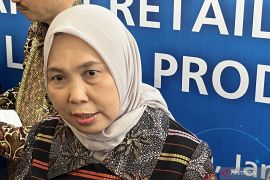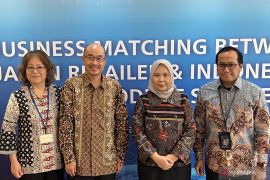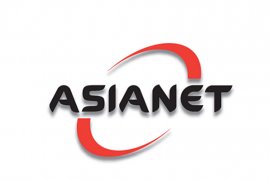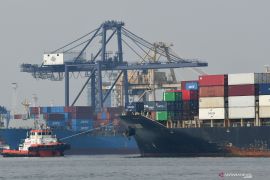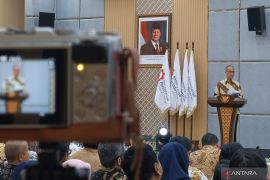Kartasasmita noted that the Industry Ministry was tasked with identifying domestic products and gauging the readiness of the domestic industry as well as pushing for the registration of domestic electronic products meeting the Domestic Content Level requirements.
The industry minister remarked that several national small and medium industries were capable of producing items required by offices and schools. Hence, the ministry elected to shop from local industries.
On March 22-24, 2022, the ministry had conducted business matching between ministries, agencies, and regional governments with associations and industrial companies in the Nusa Dua area, Bali.
The event was conducted in accordance with Presidential Instruction Number 2 of 2022 on expediting usage of domestic products and products of Micro, Small Business, and Cooperatives as part of the Proudly Made in Indonesia National Movement.
Minister Kartasasmita deemed business matching as an important measure to grow the political will of government officials and state-owned enterprises to increase the purchase of domestic products.
Director General of Small, Medium, and Multifarious Industries (IKMA) at the Industry Ministry, Reni Yanita, highlighted that among the most sought-after or high-demand products during business matching, as listed on dashboard.kemenperin.go.id/bisma, included infrastructure packages, buildings, food, vehicles, laptops, and furniture.
Yanita opined that the challenge posed for including the furniture commodity into the e-catalog was the absence of sufficient demand. In order to address this matter, furniture companies must ready several images for better visualizations and list detail of the specifications of customized items, such as cabinets, meeting tables, and work desks.
Her administration maintains coordination with the stakeholders to identify the expenditure needs of ministries, agencies, and regional governments, which could be met by small and medium enterprises. In addition to furniture, there were agricultural devices, clothing, and machinery.
They also encouraged small and medium industries to immediately partake in the Electronic Procurement Service, National Public Procurement Agency sectoral catalog, and Procurement Defense, so that their products could be bought by ministries, agencies, and local governments.
"Currently, small and medium industries' products have been listed into four categories of the National Public Procurement Agency Sectoral Catalog: electrical devices, other machine tools, appropriate technology machinery or equipment, and hand tools," he remarked.
On the other hand, the potential products in the food and beverage sector were processed foods, milk, simplicia, and herbal drinks.
Apart from that, there were also various industrial products, such as educational toys, sports equipment, stationery, drawing and painting tools, cleaning supplies, clothing and leather products from small and medium enterprises, such as batik, apparel, footwear and bags, personal protective equipment, and goodie bags. As for chemical and craft products that could potentially be ordered, the goods include hand sanitizers, disinfectants, and craft products for home decor.
“Main products, such as medical devices, agricultural machinery and food processing, as well as agricultural or plantation tools with large demand, are also expected to be met by domestic industries, especially by small and medium enterprises. Small and medium industries can also supply needs for building, hospital, school lighting, road lighting, medical devices, local software, and industrial 4.0 innovation products," she stated.
Yanita expected that the enterprises producing sought-after goods would be able to utilize this opportunity by continuously improving product quality and business capabilities, given that the government seeks to buy the required items from small and medium industries.
"We continue to conduct programs to increase human resource competence, product quality development, standardization, facilitation of machinery and equipment, and open access to promotions and markets, so that SMEs can meet (the needs of) domestic and foreign markets in a competitive manner," Yanita remarked.
The industry ministry also participated in the second phase of business matching on April 11-21, 2022, which was hosted by the Cooperatives and Small, Medium Enterprises Ministry, by including business actors under guidance of the Director General of Small, Medium, and Multifarious Industries in the showcase of their own agricultural equipment and heavy equipment products. It also involved 32 companies assisted by the Directorate of Machinery Industry and Agricultural Machinery Equipment of the Directorate General of Steel, Machinery, Transportation, and Electronics at the Industry Ministry.
The ongoing implementation of business matching has pushed up the value of the commitment that has increased to reach Rp220.80 trillion as of April 25, 2022, as shown by dashboard.kemenperin.go.id/bisma.
The commitment value consists of 34,123 packages of domestic products and involves 6,579 companies that created domestic products. The business matching is set to be completed on May 31, 2022, with a total commitment of Rp500 trillion.
Related news: Trade Ministry holds Ramadan Fashion Festival 2022
Related news: National farming equipment industry urged to use MSMEs-made components
Related news: Vice President Amin launches 'Gernas BBI' in West Sumatra
Translator: Sella P G, Mecca Yumna
Editor: Sri Haryati
Copyright © ANTARA 2022

